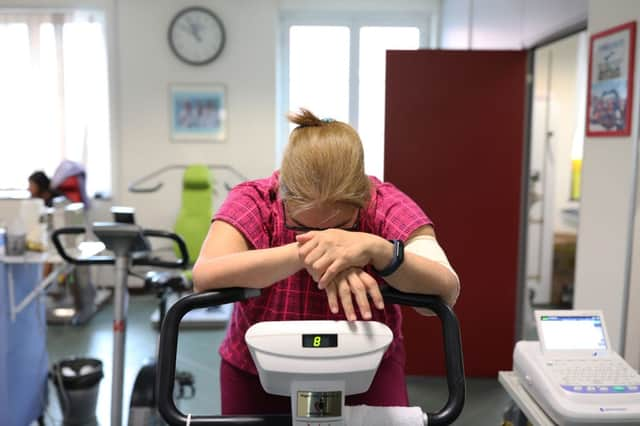Long Covid sufferers report smelling foul odours all the time


Loss or change in taste and/or smell is a common Covid-19 symptom, but some suffering from long Covid are finding that they are continuing to smell foul odours for months after catching the virus.
This side effect is referred to as parosmia, which means a distortion of smell, and patients have reported being plagued by unbearable odours, such as fish and burning.
‘Very strange and unique symptom’
Advertisement
Hide AdAdvertisement
Hide AdEar, nose and throat (ENT) surgeon Professor Nirmal Kumar called the symptom “very strange and unique,” and said that it appears to be affecting young people and healthcare workers in particular.
Professor Kumar was among the first to identify anosmia (the loss of smell) as a Covid-19 indicator back in March. He urged Public Health England (PHE) to add it to the symptom list, months before it became official guidance.
Talking to the Press Association, he said, “This morning I saw two patients with parosmia.
“One said they could smell fish in place of any other scent, and the other can smell burning when there is no smoke around.
Advertisement
Hide AdAdvertisement
Hide Ad“Both are healthcare workers, and we think there is increased incidence in young people and also in healthcare workers because of exposure to the virus in hospitals. For some people, it is really upsetting them.”
The professor explains that professionals are referring to this occurrence as a “neurotropic virus.”
“What this means is the virus is affecting nerves in the roof of the nose - it’s like a shock to your nervous system, and the nerves aren’t functioning,” he explained.
‘Most things smelled disgusting’
A 24 year old banker living in London, Daniel Saveski, said that he lost his sense of taste and smell for two weeks after contracting the virus in March, and has been suffering from parosmia since.
Advertisement
Hide AdAdvertisement
Hide AdHe said that strong smelling things, like bins, now have a burning, sulfur-like smell, “like toast.”
Mr Saveski said, “It’s lessened my enjoyment of food, and it’s a bit depressing not being able to smell certain foods.”
Lynn Corbett, an administrator for an estate agent, said that she was “shocked” to wake up on her 52nd birthday in March with “absolutely no smell or taste.”
Ms Corbett said, “From March right through to the end of May, I couldn’t taste a thing - I honestly think I could have bitten into a raw onion such was my loss of taste.”
Advertisement
Hide AdAdvertisement
Hide AdShe explained that her sense of smell began to return in June, except “nothing smelled like it should.”
“Most things smelled disgusting, this sickly sweet smell which is hard to describe as I’ve never come across it before,” she explained.
Ms Corbett also added that despite being a “coffee addict” before March, the drink now smells “unbearable,” as do beer and petrol.
She said, “I’m not sure if things will ever return to the way they were.
Advertisement
Hide AdAdvertisement
Hide Ad“I’m okay with it, I just think myself lucky that if I did have coronavirus, which it looks like I did, then I haven’t been seriously ill, hospitalised or died from it like so many others.”
Smell training could help
AbScent is a charity which supports people with smell disorders, and it is currently gathering information from thousands of patients with anosmia and parosmia, in partnership with ENT UK and the British Rhinological Society, in order to aid the development of therapies.
AbScent advises anyone who is affected by parosmia to undergo a therapy called “smell training,” which involves smelling rose, lemon, clove and eucalyptus oils each day for around 20 seconds in an effort to slowly regain their sense of smell.
The charity says, “Open a jar and hold it to your nose. Take some gentle sniffs for 20 seconds.
Advertisement
Hide AdAdvertisement
Hide Ad“During this time, concentrate on what you are doing. Keep your mind on lemon for instance, or one of the other smell training smells. Try to block out any intrusive thoughts. Be as attentive as you can and try to recall what your experience of lemon was.”
“There are some promising early reports that such training helps patients,” Professor Kumar said.
A version of this article originally appeared on our sister site The Scotsman